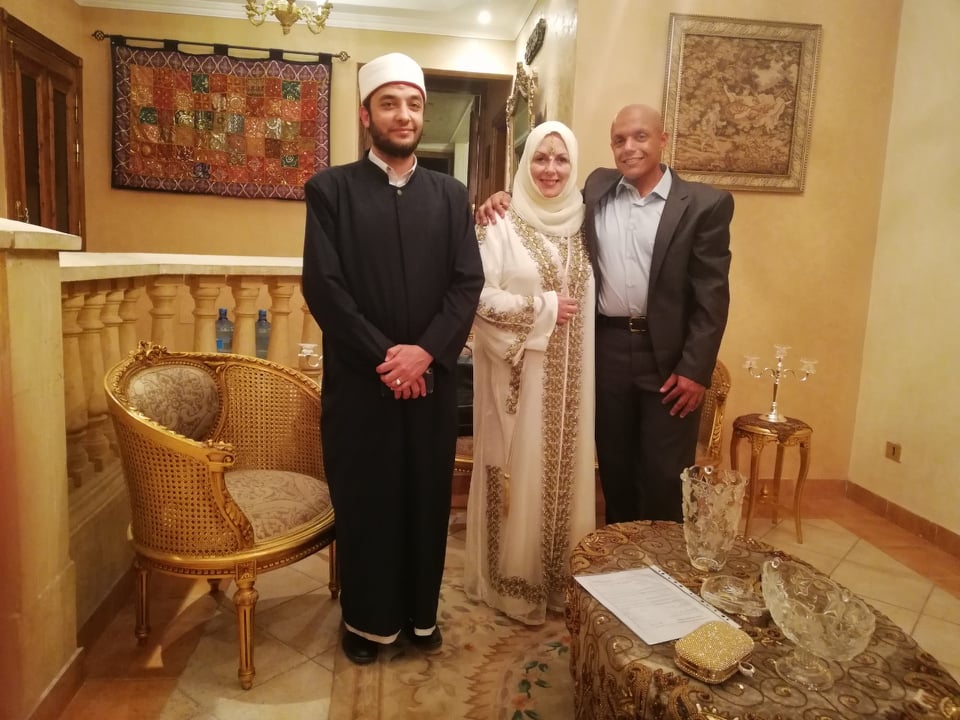Author. Marisa Lopez Chicote
As I promised you yesterday, we are going to complete a little more the post about the couple relations of the Egyptian Muslim community that is 90% of the total population of Egypt.
Yesterday, we talked that during the official proposal to the bride, the date of the engagement party is set.
ENGAGEMENT PARTY (KHOTUBA)
The courtship of the new couple is made official with an engagement party whose cost is borne by the bride and her family depending on the economic and social level of the couple, it can be done at the bride’s home or in a hotel , or a boat on the Nile or in one of the many places where events of this type are held.
During the party, the groom puts on the bride the shabka that they will have previously bought with the bride for the agreed cost. Shabka should have also the engagement ring that was given during the courtship (as an inheritance of the Anglo-Saxon colonization). Thee engagement ring is put it on the right hand and changed to the left on the wedding day. Unlike in my country Spain, we wear in the left hand during the engagement period.
At the party, the bride and groom, very well dressed for the occasion, sit on decorated chairs called koshas on a small stage and people come to congratulate them and take pictures with them. Only the family is usually invited to the khotuba party and it may include friends of the bride and groom.
During the party, food and refreshments are served and above all, people dance.
The Egyptian custom is that the bride dances only with the groom and with the women and the groom with her and with the men. They do not usually mix genders during the dance although they are in the same space but each one in a different circle.
After this party, the bride and groom are officially engaged to marry and in a certain period that varies according to various factors, especially the economic one, since the groom has to contribute many things and does not always have money to do so and the bride also has to buy everything that has been left and also there is not always so much money available and it takes time
Sadly and in recent times, many people get into loans that they cannot pay later, to prepare the marriages of their children and end up in jail.
Egyptians are not like us, Europeans, who can marry four pieces of furniture from IKEA and then little by little buy the rest between the two of them. They especially want to marry with everything put down to the smallest detail and that costs a lot of money that most of the population do not have.
Many mothers start buying their daughters’ trousseau since their daughter’s birth.
The average courtship is one to two years and during this time the couple, depending on the level of conservatism of their parents, go out alone or accompanied and visit as a family.
All this of course without any physical relationship (in most cases) since in Egyptian society marrying a virgin is still an important value.
KATB THE KETAB
This is literally registering the marriage and it is the religious marriage with a mazoon who also registers the marriage in the civil registry.
This marriage is only valid between couples, both are Egyptians. For mixed couples, the only legal marriage is in the Ministry of Justice.
Kabt el ketab normally is celebrated in a mosque but currently a lot couples do on the same day with the wedding party to save money.
The ceremony of the katb ketab day:
The mazoon invited people to arrive before the bride and groom. They are usually offered chocolate, juices and sweets. As soon as the couple arrives, the atmosphere is filled with sounds of zagaro ts –sounds women do with their tongues in weddings and such celebrations to express happiness. It’s literally like saying “lulululy!” Yes, it’s a little funny. After that, the couple, their fathers and the mazoon ( marriage officiant) sit together on a table. The couple begins to repeat vows after the officiant and then sign the marriage contract. Their fathers also sign as witnesses on their marriage. Then everyone prays for them and tells them alf mabrouk ( congratulations ). At this point, the couple is officially married but most of the couples do not begin life together until the wedding is celebrated (Farah) or also known as the night of the entrance (the dohla) or the big night (the leila el kibira )

Tomorrow we continue with the henna night and talking about farah and all its customs
About the Author: Marisa Lopez Chicote is an event planner and mother of 5, living in Cairo and Muslim since 1985, alhamdullah. She loves travelling and cooking.
- Navigating Financial Independence: Essential Tips for Young Adults
- The Importance of Mental Health in Marriage: An Islamic Perspective
- Eco-Elegant Nuptials: How to Plan a Stylish and Sustainable Wedding
- Modern Matrimony: Tech Tools to Perfect Your Wedding Planning Process
- 5 Budget-Friendly Ways to Prep Your Home for Your Wedding Day
ELEPHANT ROOT HACK
кейтеринг Орск
PRIMERA REVIEWS
NEWERA PRIMERA






ELEPHANT ROOT TRICK